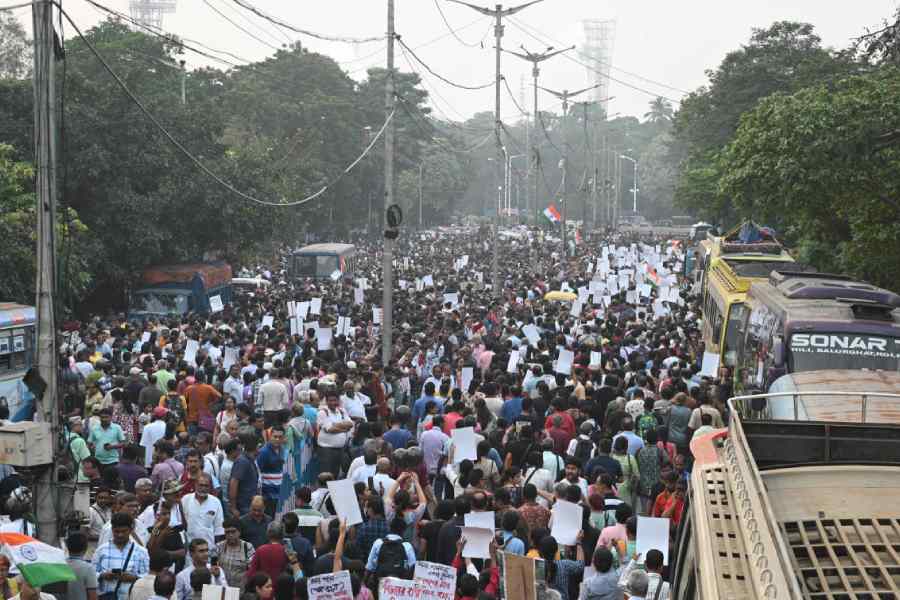The Supreme Court on Tuesday directed the Bengal government to file an affidavit explaining the process of appointing civic volunteers, one of whom is the lone suspect in the rape and murder of a doctor at RG Kar Medical College and Hospital.
The bench observed that “otherwise, this is a nice process of conferring political patronage on people who are totally unverified”.
A bench headed by Chief Justice D.Y. Chandrachud passed the directive amid concerns raised by lawyers appearing for doctors that civic volunteers were being illegally appointed and were acting as extra-constitutional authorities despite the apex court in 2011 banning “private militias” in the Nandini Sundar Vs State of Chhattisgarh case.
The bench, which also had Justices J.B. Pardiwala and Manoj Misra, said civic volunteers should not be appointed in “sensitive” and “vulnerable” places like hospitals and police stations. It expressed dismay at the “lack of substantive progress” made by the National Task Force in carrying out the top court’s August 20 order
asking it to formulate protocols to prevent crimes such as the one at RG Kar.
While the apex court formally took on record the updated status report submitted by the CBI, including the chargesheet against lone accused Sanjay Roy, a civic volunteer, senior advocate Indira Jaising, appearing for some of the striking doctors, submitted that barring eight doctors, all others have resumed their duties.
Tuesday’s hearing of the RG Kar case focussed on the Mamata Banerjee government’s decision to appoint civic volunteers. The court sought to know the legal validity of such appointments, how the recruitments are done and the budgetary allocation. The next hearing will be held after the Diwali recess.
“We want to know how these civic volunteers are recruited. What is their source of appointment? We need to know what are the qualifications required. We need to know that such volunteers do not operate in hospitals and schools, which are sensitive in nature,” Justice Chandrachud said.
The court passed the directive after senior advocates Vrinda Grover and Karuna Nundy, appearing for various doctors’ associations, raised apprehensions over the practice of appointing civic volunteers, pointing out that Sanjay Roy had access not only to RG Kar hospital but also the police machinery despite himself facing criminal cases for domestic violence.
Grover claimed Roy got the job despite the cases. Nundy told the bench that the concept of civic volunteers itself was illegal and unconstitutional and cited the apex court judgment in the Nandini Sundar Vs State of Chhattisgarh case wherein the Salwa Judum — special cops hired ostensibly to counter Maoists — was declared illegal.
Another counsel informed the court that the civic volunteers had control over each and every police station in Bengal.
Senior advocate Rakesh Dwivedi told the bench that the security personnel at the hospitals were being recruited as per the Private Security Agencies (Regulations) Act, 2005.
The bench directed the state government to file an affidavit with the following details:
◉ The legal source of authority for the recruitment of civic volunteers
◉ The modalities for recruitment
◉ The required qualifications
◉ Pre-recruitment verifications
◉ The institutions where they are assigned duties
◉ Whether the payments made to civic volunteers are on a daily or monthly basis and the budget outlay.
“The affidavit by the state shall specifically disclose the process which is followed to recruit the civic volunteers and the steps taken to ensure that such volunteers do not operate in any event where sensitive establishments such as hospitals and schools which may be particularly vulnerable,” the court’s written order said. “The affidavit shall also disclose the number of civic volunteers attached to police stations and investigations of crime.”










